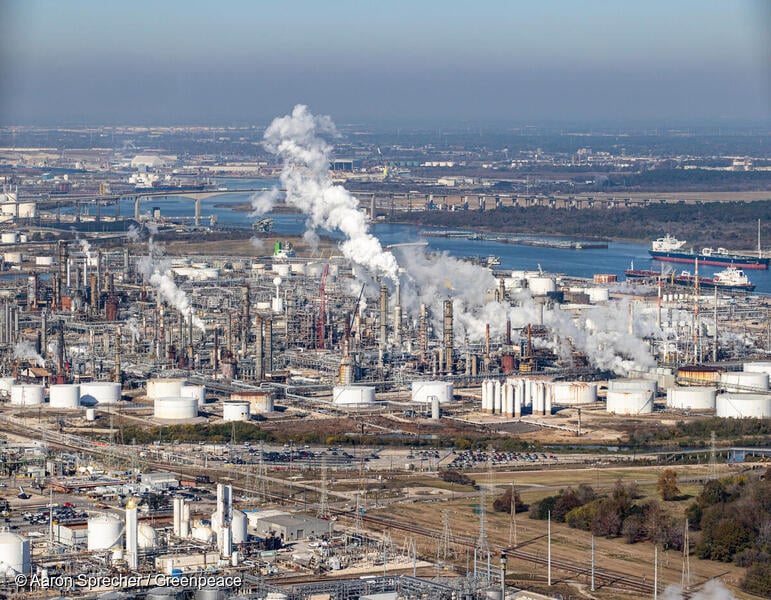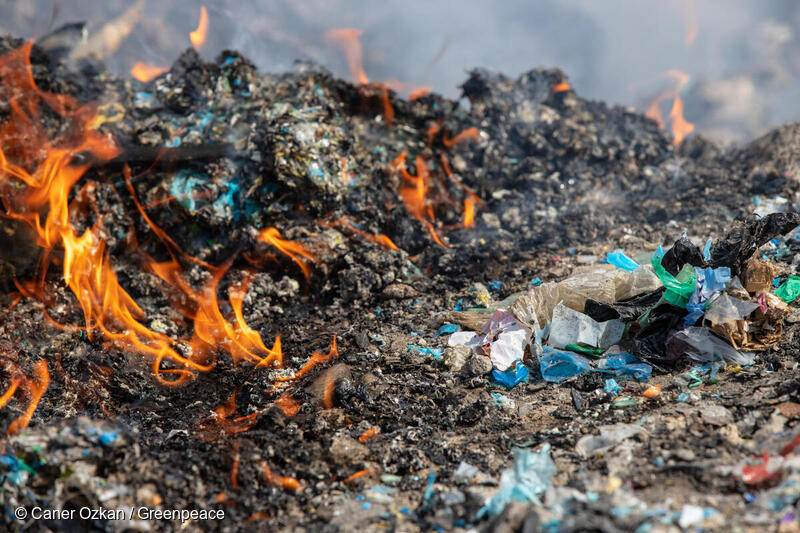Beyond Marine Litter: How A Comprehensive Global Plastics Treaty Can Drive Ambitious Change
The United States has a critical role to play in the creation of a global plastics treaty. The Biden Administration must support a legally binding global instrument covering the entire life cycle of plastics.

I’ve been involved in the evolution of Greenpeace’s Plastic Free Future campaign since 2018, when advocacy work was mainly centered on plastic bag bans and educating consumers on the dangers of a throwaway culture that big brands and corporations are attempting to push into the mainstream. In addition to mitigating the most basic harms connected to plastic, like polluted waterways and beaches, Greenpeace’s Plastic Free Future campaign has been tirelessly fighting to connect the dots between climate justice, plastic pollution, and ending the era of fossil fuels. To slow the climate crisis, we must end our reliance on single-use plastics. The same fossil fuel companies that have destroyed our climate have continued to see profits grow through their expanded production of single-use plastics. Almost all plastic is produced from fossil fuels, so we can strike a significant blow to these companies by phasing out single-use plastics by taking unified global action.
The movement is at an important impasse, we’re about to start the process for establishing a global treaty focused on the plastic pollution crisis. We have a chance to solve the plastic crisis before it becomes too big to handle.
In just a few weeks, the United Nations Environmental Assembly (UNEA) will convene in Nairobi, Kenya to discuss the opportunity of addressing the plastic pollution crisis on a global scale for the first time ever. The environmental community has seen many ambitious treaties over the decades that have fallen short of expectations. How will a global treaty addressing the plastic pollution crisis change anything?
Plastic pollution is not just a marine litter problem and can not be solved by focusing on downstream solutions such as recycling. Plastic pollution is a biodiversity, human health, and human rights issue and disproportionately impacts the Global South, socio-economically challenged communities, and people of color. UNEA has a pivotal opportunity to solve/confront/address the problem of plastic pollution through a legally binding, comprehensive global treaty. It must cover the entire lifecycle of plastic, including extraction, production, transport, use, disposal and remediation.

A strong global treaty means keeping oil and gas in the ground, it means big brands switching to refill and reuse systems, it means working in solidarity with frontline communities, and it means cleaner air and a safer climate for us all.
At UNEA 5.2, governments will work to adopt a resolution that will establish the scope of the treaty and kick-off the rest of the process. The two resolutions on the table are the Japan Resolution, which only covers marine plastic litter and downstream solutions, and the Rwanda-Peru Resolution which is both much more ambitious and more widely supported.
The Rwanda-Peru Resolution will do the following:
- Establish an Intergovernmental Negotiating Committee, to negotiate a legally binding instrument.
- Address the full lifecycle of plastics, from oil and gas extraction to waste disposal. Because plastic is polluting far more than our marine environment, we cannot limit the scope to marine litter.
- Prioritize solutions in accordance with the waste hierarchy, starting with reduction and reuse. Focusing on false solutions like bioplastics and recycling will not solve this problem.
- Support Frontline workers and communities being impacted by plastic pollution at every stage of its lifecycle, ensuring a just transition and green future for these communities.
The United States has a critical role to play in the creation of a global plastics treaty. President Biden and Secretary of State Antony Blinken must support a legally binding global instrument covering the entire life cycle of plastics, including extraction, production, transport, use, disposal and remediation. We ask you to support a mandate that paves the way for a strong treaty on plastic, as outlined in the Rwanda-Peru resolution.

If an ambitious resolution isn’t adopted in just a few short weeks in Nairobi, a lot is at stake. Only an ambitious new global treaty with key provisions such as quickly phasing down plastic production and promoting the upscaling of reuse, refill and traditional packaging systems worldwide is capable of addressing the current plastic pollution crisis. Only the Rwanda-Peru resolution does just that, in addition to ensuring the global plastics treaty down the line can grow and adapt as the plastic pollution crisis changes by enacting an open mandate.
Add your voice to the thousands of changemakers to ensure President Biden and Secretary Blinken get the message — support the Rwanda-Peru resolution or we will lose our best chance of combating the global plastic crisis and driving real change towards the green and just world we’re all fighting for.
We cannot afford to miss this chance to solve the plastic crisis before it becomes too big to handle.
